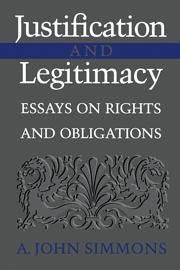Book contents
- Frontmatter
- Contents
- Introduction
- Acknowledgments
- 1 The Principle of Fair Play
- 2 Fair Play and Political Obligation: Twenty Years Later
- 3 The Obligations of Citizens and the Justification of Conscription
- 4 Associative Political Obligations
- 5 External Justifications and Institutional Roles
- 6 Philosophical Anarchism
- 7 Justification and Legitimacy
- 8 “Denisons” and “Aliens”: Locke's Problem of Political Consent
- 9 Human Rights and World Citizenship: The Universality of Human Rights in Kant and Locke
- 10 Original-Acquisition Justifications of Private Property
- 11 Historical Rights and Fair Shares
- 12 Makers' Rights
- Index
10 - Original-Acquisition Justifications of Private Property
Published online by Cambridge University Press: 05 June 2012
- Frontmatter
- Contents
- Introduction
- Acknowledgments
- 1 The Principle of Fair Play
- 2 Fair Play and Political Obligation: Twenty Years Later
- 3 The Obligations of Citizens and the Justification of Conscription
- 4 Associative Political Obligations
- 5 External Justifications and Institutional Roles
- 6 Philosophical Anarchism
- 7 Justification and Legitimacy
- 8 “Denisons” and “Aliens”: Locke's Problem of Political Consent
- 9 Human Rights and World Citizenship: The Universality of Human Rights in Kant and Locke
- 10 Original-Acquisition Justifications of Private Property
- 11 Historical Rights and Fair Shares
- 12 Makers' Rights
- Index
Summary
Original Acquisition
My aim in this essay is to explore the nature and force of “original-acquisition” justifications of private property. By “original-acquisition” justifications, I mean those arguments which purport to establish or importantly contribute to the moral defense of private property by: (a) offering a moral/historical account of how legitimate private property rights for persons first arose (i.e., at a time prior to which no such rights existed); (b) offering a hypothetical or conjectural account of how justified private property could arise (or have arisen) from a propertyless condition; or (c) simply defending an account of how an individual can (or did) make private property in some previously unowned thing (where “things” might include not only land, natural resources, and artifacts, but also, e.g., ideas or other individuals). The “original acquisition” to which such justifications centrally refer, then, may be either the first instance(s) of legitimate private property in human history (typically assumed to have been many centuries ago on earth), or only the first legitimate acquisition of some particular thing (which might, for instance, have occurred yesterday or occur in the future on Mars). But in either case, the justification will involve or entail the defense of one or more moral principles specifying how unowned (or collectively owned) things can become privately owned – that is, the defense of the kind of principles Robert Nozick has called “principles of justice in acquisition.”
- Type
- Chapter
- Information
- Justification and LegitimacyEssays on Rights and Obligations, pp. 197 - 221Publisher: Cambridge University PressPrint publication year: 2000

